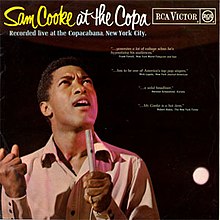Sam Cooke at the Copa
| Sam Cooke at the Copa | ||||
|---|---|---|---|---|
 | ||||
| Live album by | ||||
| Released | October 1964 | |||
| Recorded | July 7 & 8, 1964[1] | |||
| Venue | Copacabana, New York City[2] | |||
| Genre | Rhythm and blues, soul, jazz | |||
| Length | 35:37 | |||
| Label | RCA Victor | |||
| Producer | Al Schmitt | |||
| Sam Cooke chronology | ||||
| ||||
Sam Cooke at the Copa is a live album by American singer-songwriter Sam Cooke.[9][10] The album was released in 1964 in the United States by RCA Victor.[4] It was Cooke's only live album to be released during his lifetime; Live at the Harlem Square Club, 1963, although recorded earlier, was not released until 1985.[11] Copa was reissued in 2003, with remastered sound.[12]
The album peaked at No. 29 on the Billboard 200.[13]
Production
[edit]The album was recorded during a two-week stand in July 1964.[14] The shows during the 1964 engagement were well received, in contrast to a show Cooke performed at the Copa in 1958.[14][15][16] Staying away from the Copa—and from many "white" clubs—for years, Cooke was inspired to return after watching Nat King Cole go over well there.[17] Cooke chose to perform a set heavier on standards and show tunes.[18]
Sam Cooke at the Copa was produced by Al Schmitt.[19] It was recorded on 3 tracks, and was engineered by Bernard Keville.[20]
Critical reception
[edit]AllMusic wrote: "One of a handful of live albums by a major soul artist of its era, it captured Cooke in excellent voice, and was well-recorded -- it just wasn't really a 'soul' album, except perhaps in the tamest possible definition of that term."[3] The New Rolling Stone Album Guide called the album "genial, and even a bit cheesy in a jivey, Vegas kind of way, but nonetheless spirited in its own right."[7] The Chicago Tribune wrote that Cooke's "fluttering yodel and charming demeanor make evident that he knew he had crashed through the invisible ceiling, hurdling the only barrier he hadn't yet cleared and solidifying his status as the ultimate crossover artist."[1]
The Times wrote that the album "captures the more decorous version of the singer’s live act."[21] Praising the sound of the 2003 reissue, The Baltimore Sun wrote that Cooke "still manages to imbue such stuffy standards as 'Frankie and Johnny', 'If I Had a Hammer' and 'Tennessee Waltz' with gospel-dipped exuberance."[22]
Track listing
[edit]Side one
[edit]- "Opening Introduction" – 0:35
- "The Best Things in Life Are Free" (Lew Brown, Buddy DeSylva, Ray Henderson) – 1:31
- "Bill Bailey Won't You Please Come Home" (Hughie Cannon) – 2:50
- "Nobody Knows You When You're Down and Out" (James Cox) – 3:18
- "Frankie and Johnny" (Cooke) – 3:00
- Medley: "Try a Little Tenderness" / "(I Love You) For Sentimental Reasons" / "You Send Me" (William Best / Sam Cooke / Deek Watson) – 4:55
- "If I Had a Hammer" (Lee Hays, Pete Seeger) – 6:25
Side two
[edit]- "When I Fall in Love" (Edward Heyman, Victor Young) – 3:05
- "Twistin' the Night Away" (Cooke) – 5:04
- "This Little Light of Mine" (Cooke) – 3:36
- "Blowin' in the Wind" (Bob Dylan) – 3:01
- "Tennessee Waltz" (Pee Wee King, Redd Stewart) – 3:36
Personnel
[edit]All credits adapted from the album's remastered liner notes.[23]
|
|
See also
[edit]References
[edit]- ^ a b "Remastered Sam Cooke albums capture his soul". Chicago Tribune. Retrieved March 30, 2021.
- ^ Baggelaar, Kristin (2006). The Copacabana. Arcadia Publishing. p. 116.
- ^ a b "AllMusic Review by Bruce Eder". AllMusic. Retrieved March 30, 2021.
- ^ a b Larkin, Colin (2006). The Encyclopedia of Popular Music. Vol. 2. MUZE. p. 532.
- ^ MusicHound Rock: The Essential Album Guide. Visible Ink Press. 1999. p. 269.
- ^ The New Rolling Stone Record Guide. Random House. 1983. p. 112.
- ^ a b The New Rolling Stone Album Guide. Simon & Schuster. 2004. pp. 189, 191.
- ^ Jones, Peter; Jopling, Norman (February 27, 1965). "Sam Cooke: At The Copa" (PDF). Record Mirror. No. 207. p. 10. Archived from the original (PDF) on April 1, 2022. Retrieved August 17, 2022.
- ^ "Artist Biography by Bruce Eder". AllMusic. Retrieved March 30, 2021.
- ^ "One Night in Miami star Leslie Odom Jr. talks about Sam Cooke and changes to come". The Globe and Mail. Retrieved March 30, 2021.
- ^ Palmer, Robert (May 15, 1985). "POP LIFE". The New York Times: C21.
- ^ Harrington, Richard (July 27, 2003). "Sam Cooke's Wonderful World; A Soul Pioneer, Celebrated in CDs, DVD". The Washington Post. p. N1.
- ^ "Chart History Sam Cooke". Billboard. Retrieved March 30, 2021.
- ^ a b "How One Night in Miami Shortchanges the Greatest Singer of All Time". Slate. Retrieved March 30, 2021.
- ^ "Sam Cooke at the Copa; Young Singer Blends Rhythm and Feeling". The New York Times. Retrieved March 30, 2021.
- ^ "Sam Cooke, Portrait of a Legend: From Gospel Roots, Singer Soared to Top of the Pop Charts". NPR. Retrieved March 30, 2021.
- ^ "SAM COOKE--OUR FATHER OF SOUL". Los Angeles Times. Retrieved March 30, 2021.
- ^ "'One Night in Miami' Only Touches on the Triumph and Tragedy of Sam Cooke". Esquire. Retrieved March 30, 2021.
- ^ Walsh, Christopher (July 13, 2002). "On Krall, Cooke, Mikes and Mancini". Billboard. Vol. 114, no. 28. p. 48.
- ^ Schultz, Barbara (December 2003). "THE SAM COOKE REMASTERED COLLECTION". New York. 27 (13): 128.
- ^ "Jazz: New Releases: Sam Cooke: At the Copa". The Times. Retrieved March 30, 2021.
- ^ Ollison, Rashod (July 17, 2003). "Remastered recordings resurrect Cooke's sound". The Baltimore Sun: 25T.
- ^ Sam Cooke at the Copa (liner notes). Sam Cooke. US: ABKCO Records. 2003. 99702.
{{cite AV media notes}}: CS1 maint: others in cite AV media (notes) (link)
